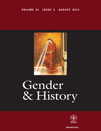
Appel à contributions
Gender, Imperialism and Global Exchanges
Avant le 1er octobre - Gender & History
Special Issue of Gender & History, 26:3 (November 2014)
Issue Editors : Stephan F. Miescher, University of California, Santa Barbara ; Michele Mitchell, New York University ; Naoko Shibusawa, Brown University
From antiquity through the twentieth century, imperial expansions were accompanied by transregional and global exchanges of goods, ideas, people, natural resources, practices and styles. As free and unfree labour travelled across spaces, so too did a variety of commodities and natural resources. We seek proposals that explore the gendered impact of such exchanges on the metropole and/or the colonies, and how these dynamics were shaped by either gendered desires, gendered relations, or gendered ideologies. In particular, we wish to problematise the very notion of ‘exchange’ through a critical examination of labour flows and goods and the extraction of resources. How, for example, can a gendered analysis of a particular political economy shed light on uneven or exploitative global practices ? How did imperial coercions of labour involve sexualised and gendered treatments of working bodies ? We also welcome essays that focus on interchange, reciprocity, or resistance, on collaborative and coalition-building, as well as extractive, exchanges. We perceive ‘empires’ broadly : as sociopolitical entities, as territories in flux, as formal regimes, as ideological and cultural hegemonies, as religious domains, as trans-regional trade networks, as multinational corporations.
Overall, we seek manuscripts that consider the gendered dimensions of sexual, bodily, social, material, political, cultural and intellectual dynamics of empire from a wide range of temporal and geographic settings. In addition to work on the Americas, Western Europe and South Asia, we are especially keen to receive proposals about other parts of the globe, including Africa, East Asia, Southeast Asia, the Pacific Islands, Central Europe, Eastern Europe and the Middle East. We strongly encourage submissions that focus on the pre-modern period. We invite submissions
from scholars in disciplines other than history whose work engages historical methodologies and analyses. Given our intention to produce a volume that is at once analytically rigorous and pedagogically useful, we are interested in articles that offer conceptual or theoretical discussion in addition to empirically-grounded case studies. We encourage potential contributors to submit work that falls under one or more of the following rubrics : labour and bodies ; ideas, politics and cultures ; goods and commodities ; practices and styles. For sample questions, please consult the extended version of this call for abstracts on the Gender & History website at
http://onlinelibrary.wiley.com/journal/10.1111/%28ISSN%291468-0424
We plan to approach the creation of this special issue via a colloquium to be held at New York University (or Brown University) on Friday and Saturday, May 17-18, 2013. Please submit 1-2 page abstracts in English (500-750 words maximum) to gendhist@umn.edu by October 1, 2012, with ‘Special Issue 26:3 abstract submission’ in the subject line (limited funds for the translation of articles written in other languages might be available). Invitations to present at the colloquium will be issued in November 2012. Papers must be submitted for pre-circulation to the editors by April 1, 2013, as a condition of participation.
Fichiers de syndication :
Statistiques :
Le site contient 4383 articles
